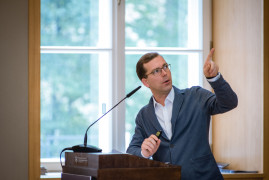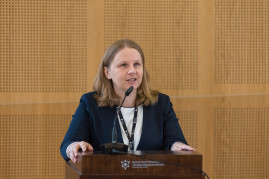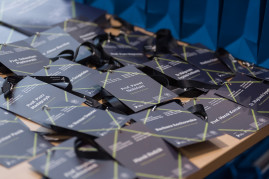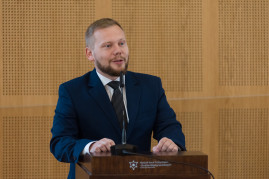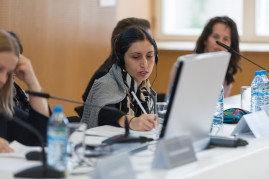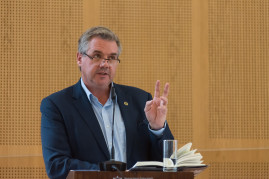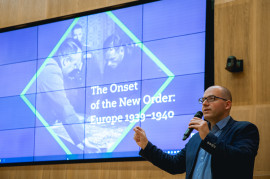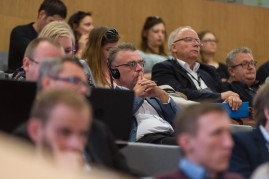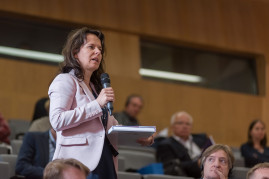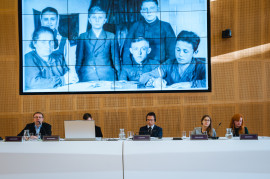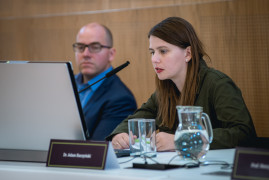The Onset of the New Order: Europe 1939–1940 | International scientific conference - Instytut Pileckiego
conference
17.09.2019 (Tue) 00:00
The Onset of the New Order: Europe 1939–1940 | International scientific conference
The 80th anniversary of the outbreak of the Second World War was an ideal opportunity to focus scholarly attention on this pivotal era of global history.
- 17–19 September 2019
- Faculty of Political Science and International Studies at the University of Warsaw
- Warszawa, Krakowskie Przedmieście 26/28
Between the German invasion of Poland on 1 September 1939 and the spring of 1940, when Hitler shifted his attention to the military campaign against the West, Europe for the first time experienced a form of occupation and total war aimed specifically at the destruction of entire societies, nations, and peoples. It was in Poland that the Nazi New Order for Europe would first begin to be implemented, and where it would be most fully felt – a premonition of what was in store for the whole of Europe. Almost simultaneously, Poland would also experience invasion and occupation by the Soviet Union, beginning a similar process of state destruction, mass deportations and repression. This would soon be followed by Soviet occupation in much of Finland and of the Baltic states. This period may serve as the point of departure for many of the issues touched upon in our research on modern history, and as the basis of our common understanding of the war.
This conference focuses on issues such as the nature of totalitarianism and how it was understood by the governments and peoples of the allied nations in those moments leading up to and following the two invasions. We also aim to explore the effects of total war upon the civilian populations and upon the Jewish diaspora as collective trauma, and how this has shaped our memories and our narratives of this period. The conference also invites debate about our understanding of the modern world, with its rapid military, technological, political and social changes, full of threats and possibilities.
To fully explore these critical events and processes, we have invited scholars from all disciplines, and although our primary focus is on this initial stage of the war, we will also discuss topics that place it in a wider chronological and/or geographical context. While attaching great importance to a study of the historical circumstances of September 1939, we are equally interested in assessing how we formulate our contemporary understanding of the subject through – among others – scholarship, museology, and education.
KEYNOTE LECTURES:
17.09 | Roger Moorhouse: Poland’s Defensive War of 1939: A Bloody Prelude
18.09 | Prof. Marek Kornat: The West’s First Opinions on the September Campaign
19.09 | Prof. Stephan Lehnstaedt: Polenfeldzug: Crimes Committed Against Poland in the September Campaign of 1939 and Their Place in Germany’s Modern Memory
PARTNER: Faculty of Political Science and International Studies University of Warsaw
See also
- Steve Crawshaw at the Pilecki Institute in Berlin! | Accompanying Event: “Unknown Legacies of the Nuremberg.”
Event
Steve Crawshaw at the Pilecki Institute in Berlin! | Accompanying Event: “Unknown Legacies of the Nuremberg.”
Join us a special event accompanying our two-day international conference “Unknown Legacies of the Nuremberg Trial: Regional Approaches and Perspectives in East Central Europe.”
- Conference: Unknown Legacies of the Nuremberg Trial: Regional Approaches and Perspectives in East Central Europe
conference
Conference: Unknown Legacies of the Nuremberg Trial: Regional Approaches and Perspectives in East Central Europe
We are pleased to invite you to participate in the academic conference "Unknown Legacies of the Nuremberg Trial: Regional Approaches and Perspectives in East Central Europe".
- Film "Soviet Camp 0331"
Event
Film "Soviet Camp 0331"
As part of the program accompanying the opening of the Pilecki Institute headquarters at 82 Sienna Street, we invite you to a screening of a film about the tragic experiences of the inhabitants of the Vilnius region.
